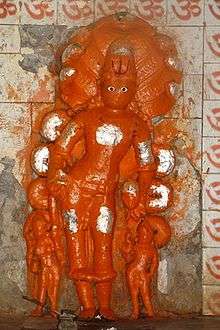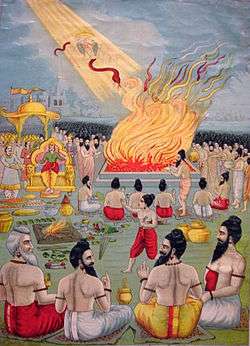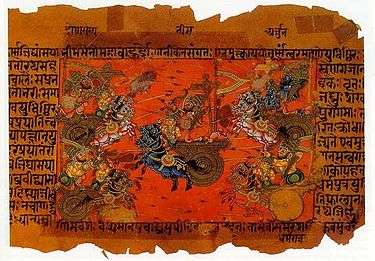Takshaka
| Takshaka | |
|---|---|
 Idol of Takshaka at Taxakeshwar temple | |
| Devanagari | तक्षक |
| Sanskrit transliteration | Takṣaka |
| Affiliation | Nāga |
| Abode | Indraloka |
Takshaka Takṣaka) was one of the Nagas mentioned in the Hindu epic Mahābhārata. He lived in a city named Takshasila, which was the new territory of Takshaka after his race was banished by Pandavas led by Arjuna from the Khandava Forest and Kurukshetra, where they built their new kingdom.
The king of Nagas
Takshaka is mentioned as a King of the Nagas at (1,3). Takshaka is mentioned as the friend of Indra the Deva king, at (1-225,227,230). Takshaka, formerly dwelt in Kurukshetra and the forest of Khandava (modern-day Delhi) (1,3). Takshaka and Aswasena, are constant companions who dwell in Kurukshetra on the banks of the Ikshumati (1,3). Srutasena, the younger brother of Takshaka, resided at the holy place called Mahadyumna with a view to obtaining the chiefship of the serpents (1,3).
Family
According to Shrimad Bhagavatam, Takshaka belonged to the Ikshvaku dynasty. He was a descendent of Shri Rama. The name of Takshaka's son was Brihadbala, who was killed in battle by Abhimanyu, the son of Arjuna.
In the forest of Khandava dwelleth, with his followers and family, the Naga, called Takshaka, who is the friend of Indra (1,225). Nagas lived there with other tribes like the Pisacha, Rakshasas and Daityas and Danavas (clans of Asuras ) (1,227). Arjuna burned that forest. At that time the Naga chief Takshaka was not there, having gone to Kurukshetra. But Aswasena, the mighty son of Takshaka, was there. Arjuna slew Takshaka's wife, the mother of Aswasena. But Aswasena escaped (1-229,230) (4,2). To revenge upon the slaughter of his mother, Aswasena attacked Arjuna during Kurukshetra War (8,90) (9,61), while he was battling with Karna. Aswasena is mentioned here as born in the race of Airavata (8,90). An Asura named Mayasura who was a great architect is mentioned as escaping from the abode of Takshaka when Khandava Forest was burned (1,230).
Revenge on Pandavas

After King Parikshit was cursed by a sage's son to die by a snake bite for a small mistake,Takshaka came to fulfil the curse. Takshaka did the deed by approaching in disguise (1,50) and biting Parikshit, the grandson of Arjuna and thus slaying him, while he was meditating on Lord Vishnu. He also prevented the possibility of getting any medical aid to the king, by bribing a priest in the Kasyapa clan, who was an expert in curing people from snake-poisoning (1,43). Later King Janamejaya, the son of Parikshit, fought a war at Takshasila (1,3) and expelled the Nagas headed by Takshaka from there too. Takshaka later became a robber, waiting to loot anything valuable from the travellers traversing through his domain. The Kingdom of Paushya king and the new stronghold of Takshaka was close to Takshasila. Utanka became the victim of Takshaka, while he was passing through the domain of Takshaka. By visiting Janamejaya, Utanka invoked the ire of that Kuru king directed at its full force, towards Takshaka and the Naga race. Janamejaya started a campaign, at Takshasila where he massacered the Nagas, with the view of exterminating the Naga race (1,52). Takshaka left his territory and escaped to the Deva territory where he sought protection from Deva king Indra (1,53). But Janamejaya's men traced him and brought him as a prisoner, to execute him along with the other Naga chiefs (1,56). At that time, a learned sage named Astika, a boy in age, came and interfered. His mother Manasa was a Naga and father was a Brahmin. Janamejaya had to listen to the words of the learned Astika and set Takshaka free. He also stopped the massacre of the Nagas and ended all the enmity with them (1,56). From then onwards the Nagas and Kurus lived in peace. Janamejaya became a peace-loving king.
Other references
Takshaka, disguising as a beggar, stole the ear-rings of Paushya king's queen, which she gave as a gift to a Brahmin named Uttanka. Uttanka managed to get it back with the help of others. He wished to revenge on Takshaka and proceeded towards Hastinapura, the capital of Kuru king Janamejaya, the great-grandson of Arjuna. Uttanka then waited upon King Janamejaya who had some time before returned victorious from Takshashila. Uttanka reminded the king of his father Parikshit's death, at the hands of Takshaka (1,3).
In the chapters (14-53 to 58) Uttanka's history is repeated where the ear-rings were mentioned to be of queen Madayanti, the wife of king Saudasa (an Ikshwaku king) (14,57). A Naga in the race of Airavata is said to steal away the ear-rings (14,58).
- A king named Riksha in the race of Puru (a branch of Lunar Dynasty) is mentioned as marrying the daughter of a Naga in the race of Takshaka (1,95).
- Bhishma is compared in prowess to Naga Takshaka at (6,108).
- Takshak snake means gliding snake in Hindi and Sanskrit languages.[1]
References
- ↑ "Takshak-the flying snake". Retrieved 17 August 2014.
